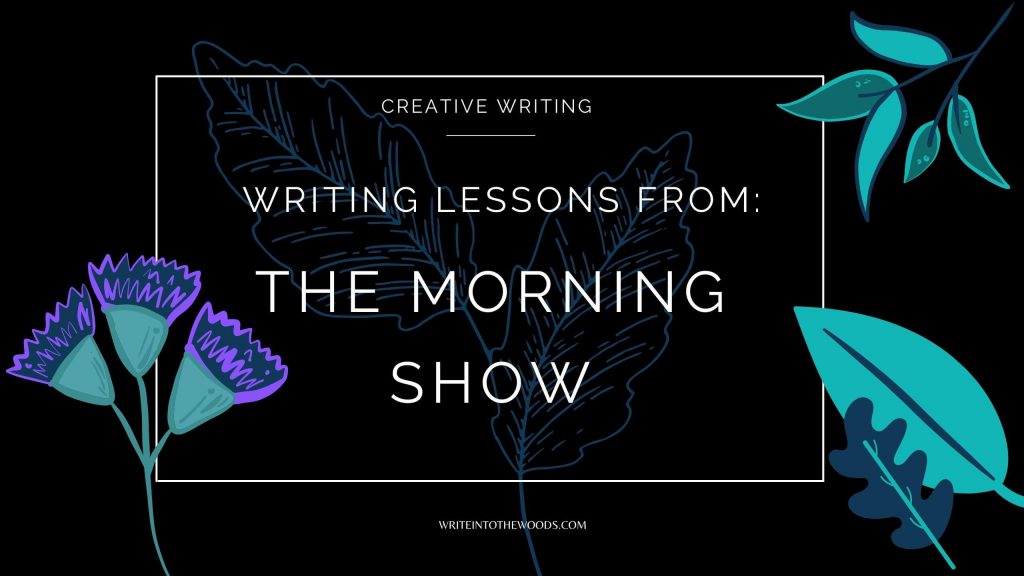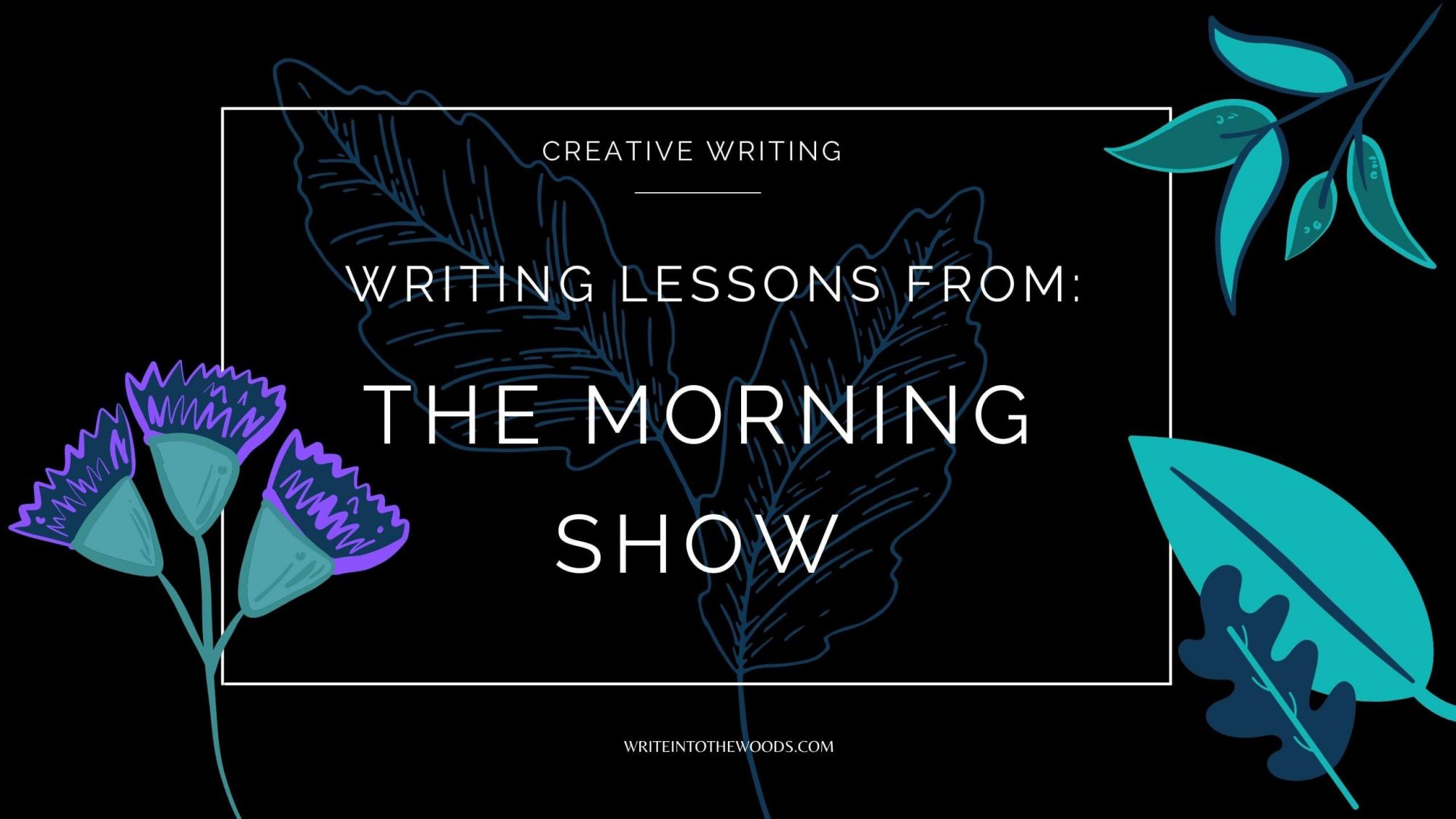
This month’s dive in my Writing Lessons From series was a big thinker for me…
The problem, of course, with streaming and there being so many things to stream, is that I always feel behind. Season one of The Morning Show was one of the first shows on Apple TV when it launched, when the MeToo movement was still in flow and hadn’t yet been sullied.
I got Apple TV back then for a few months – it came free with my husband’s new phone – but we mostly just watched Mythic Quest.
I now have Apple TV for free for five months through my Barclays account (check your Barclays app, you can get most of the Apple apps for free for up to five months).
There are a lot of amazing shows on there, namely Welcome to Wrexham, Mythic Quest (obvs.), Severance and Loot.
And then there’s The Morning Show. There are two seasons (with a third coming soon), both of which I’ve recently watched. The first season is centred around the beginning of the MeToo movement, while the second season focuses on the beginning of the pandemic. Both are very well done, but right here I’m going to focus on season one.
First, a disclaimer. The Morning Show is about sexual assault. It is real and gritty. If this is a trigger for you, then have a think before you watch it. More on this below the spoiler alert siren.
And now the usual disclaimer: Ahead there be spoilers. If you haven’t watched The Morning Show yet but you want to, save this for later.
I first want to say that if you’re like me and you want to watch it but you can’t cope with rape on screen, then don’t watch episode eight. Skip it. Just go straight to episode nine.
Episode eight is the reason I couldn’t sleep that night.
The Morning Show is about the biggest news show in America, filmed in New York, and begins as news about the male co-anchor’s sexual misconduct comes to light. Mitch is played fantastically by Steve Carell. His on-screen partner, Alex, is played equally brilliantly by Jennifer Aniston.
But this show isn’t just about sexual misconduct and what that might mean – we’re willing to believe Mitch when he yells that he never raped anyone. We want to believe him. Because there are other powers at play here, and perhaps (we hope) that is what this story is about.
There’s Alex who, despite being a similar age to Mitch, is going to lose her job because the network bosses have decided she’s ‘too old’, something all too common in that industry.
And Chip, the show’s producer, desperately trying to keep his people and his career together.
Then there’s Fred and Corey, the two network bosses, and their own hidden agendas.
Any one of them could have planted stories about Mitch. Well, maybe not Chip.
Poor Chip. (Also, isn’t Chip a great name?)
What I’m trying to get at is that The Morning Show has layers
Each character is not only well developed, but they have their own motivations.
Mitch is obviously trying to clear his name as his world falls apart, Alex is trying to desperately hold on to her career and not get dragged down with Mitch or left behind because of her age, Fred is trying to grow the network in his own sullied way, while Corey is a lover of chaos.
Corey is one of those fantastic characters that you just can’t get a handle on. He’s unpredictable and you don’t quite know if you can trust him, even though you really want to. Why? Because he’s fun. Because he’s saying all the right things. Because there’s something magnetic about him. But what if he’s like Mitch…?
Those are just some of the big, main ideas running through the season and each one of them adds a layer of interest, story and complexity. But we’re missing one: Bradley Jackson, played by Reese Witherspoon. The rogue reporter, the truth sayer, the truth finder and Corey’s pot of gold. She is the chaos.
Without her being a mixture of such a good person and a complete arsehole, a journalist and everything that entails, there wouldn’t be a story here. Without Bradley, Mitch might get away with it and Alex could lose everything.
If those primary layers weren’t enough, the writers have given extra depth and created the layers of the secondary characters. What’s clever about these is that each and every one of their stories feeds into the main plot while still being about the secondary characters. The women who have experienced Mitch’s creepiness. The men fighting for their jobs and to keep Alex afloat. Claire and Yanko’s romantic relationship and how it contrasts so starkly with what Mitch was doing.
You end up caring so deeply about all of them (because they’re well developed, no secret sauce there), and yet the main player doesn’t really come into her own until towards the end. When a truth from Hannah’s past working on The Morning Show comes to light (episode eight. I will never watch it again).
Hannah exists throughout the whole series, just as Bradley does. I never really gave Hannah much thought, until episode eight. I don’t think you’re supposed to. Bradley was the chaos brought into the fold by Corey, but Hannah was the key to the whole thing, and the interesting bit about this storytelling is that the key was kept hidden until right near the end.
I’m sure if I watch the first season back, all the clues will be there. Like when you watch Shutter Island back and it’s like watching a completely different film (highly recommend that!).
Still, despite nine episodes exploring sexual assault, consent, ageism and chaos, I wasn’t prepared for the final episode. The whole season was a wonderful build-up of not quite knowing who to trust, or what could happen next, or who you really liked, and then that final episode was everything it needed to be.
It was an explosion of everything that had been held back, and so cleverly done, bringing together each character and their arc or path.
The real beauty in the writing of season one of The Morning Show, in my opinion, is not just how cleverly the layers are built and put together, but just how far the writers were willing to push.
Don’t be scared to push
On-page/screen sexual assault and rape is not something I tolerate. I will immediately stop reading or watching. But I couldn’t do this with this show, because it’s essentially what the show is about. But it’s also not.
Mitch isn’t just a rapist.
He’s a man who didn’t understand consent.
This show isn’t just a message about the abuse of power.
It’s a message about how the education of consent has changed over the years, and how important consent is.
In episode eight, Mitch didn’t necessarily need to read Hannah’s body language or between the lines as her mind panicked and she tried to get the words out; he just needed to ask one simple question. And he failed.
And because he failed to ask that one simple question, his whole life (and Hannah’s) fell apart.
That is explored more in season two, which I found more interesting than coverage of the pandemic, if I’m honest. However, I also read a scathing review, angry that a character like Mitch had been given a voice.
Fiction, of course, is about entertainment and escapism, but it’s also about figuring out our society and world. By giving a character like Mitch a voice, we can develop some empathy for this man who became so arrogant that he forgot to ask that one simple question of consent.
Empathy does not equal forgiveness, but it does create an understanding. And understanding leads to lessons being learned.
By exploring how Mitch’s life falls apart because he didn’t ask for consent, we can learn how to educate people on asking for consent. Whether that’s through a school lesson, a chat with friends down the pub or a discussion on social media.
But, as I keep saying, that’s just one thread. One layer. One character.
We can expand on what we as watchers can learn from Mitch by studying Hannah. And Alex. And Bradley. Along with all of their own threads of depression, ageism, ambition and striving for the truth.
So…what are the writing lessons here?
To add complexity to your stories, but in the simplest of ways.
The best stories can be summed up in a sentence.
The Morning Show season one is about an American morning TV show falling apart when one co-host is accused of sexual misconduct at the beginning of the MeToo movement.
But to have a show only about that would result in a weak story.
The way around this is to treat all of your characters as human.
All humans are the main character of their story, because that’s what living your life is. And each human’s life is experienced differently, even if they are a married couple living in the same house.
To achieve this level of complexity, you must develop your characters properly. They need back story and motivation, but don’t think of it like that. That’s always felt cold and analytical to me, whereas a writer should be warm and friendly with all of their characters. You need to empathise with all of them, even the rapists. (Again, empathy does not equal forgiveness or even likeability.)
Just ask where they’ve come from, what they’ve been through and what happens next for them.
As for achieving a level of cleverness with this complexity, that comes with practice.
Start off small, with a small cast of characters. Get to know them. Let them grow and develop and mature (or not!) naturally and organically, and you’ll see it.
Eventually, their stories will intertwine and it will seem oh so simple to you, who knows each of them so well.
But your readers will be amazed at the cleverness of you.
To finish off…
Episode ten of season one of The Morning Show is an excellent lesson in bringing together all of the different layers and threads in a big climax.
An accumulation of the rage, the silent anger, the regret, the realisations of what is important and what a monster is. And this leads some of the characters to rise up and fight, while others fall back, their fight gone.
It’s beautiful.
It’s distressing and agonising.
It’s incredibly meaningful.
Have a box of tissues on hand.
